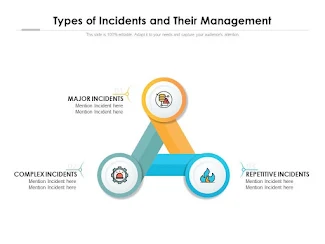Types of Incident Management
Incident management is the process of identifying, escalating, and resolving incidents that disrupt normal business operations. There are a variety of different types of incident management, each with its own unique characteristics and strengths.
1. Standard Incident Management
Standard incident management is the most common type of incident management. It is a reactive process that is triggered when an incident occurs. The incident is then escalated to the appropriate team, which investigates the incident and takes steps to resolve it.
2. Proactive Incident Management
Proactive incident management is a more proactive approach to incident management. It involves identifying potential incidents and taking steps to prevent them from occurring. Proactive incident management can be very effective in reducing the number of incidents that occur, and it can also help to reduce the impact of incidents when they do occur.
3. Risk-Based Incident Management
Risk-based incident management is a type of incident management that takes into account the risk associated with each incident. The risk is determined by the likelihood of the incident occurring and the potential impact of the incident if it does occur. Risk-based incident management helps to ensure that the most critical incidents are given the highest priority.
4. Event Management
Event management is a type of incident management that is used to manage large-scale events, such as concerts, sporting events, and conferences. Event management involves planning for potential incidents, such as crowd control, medical emergencies, and severe weather. Event management can help to ensure that events are safe and enjoyable for everyone involved.
5. Crisis Management
Crisis management is a type of incident management that is used to manage major crises, such as natural disasters, terrorist attacks, and financial meltdowns. Crisis management involves developing a plan for responding to crises, training staff on crisis response procedures, and establishing relationships with external organizations that can help during a crisis. Crisis management can help to minimize the impact of crises on businesses and organizations.
Choosing the Right Type of Incident Management
The type of incident management that is right for a particular organization will depend on the organization's size, industry, and risk profile. Organizations with a low risk of incidents may be able to get by with a standard incident management process. Organizations with a higher risk of incidents may need to implement a more proactive or risk-based approach to incident management.
Regardless of the type of incident management that is chosen, it is important to have a plan in place for responding to incidents. This plan should include clear roles and responsibilities, communication protocols, and escalation procedures. By having a plan in place, organizations can ensure that they are prepared to respond to any type of incident that may occur.
Tags: Cybersecurity
Incident
